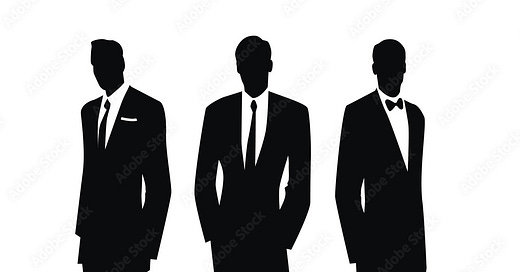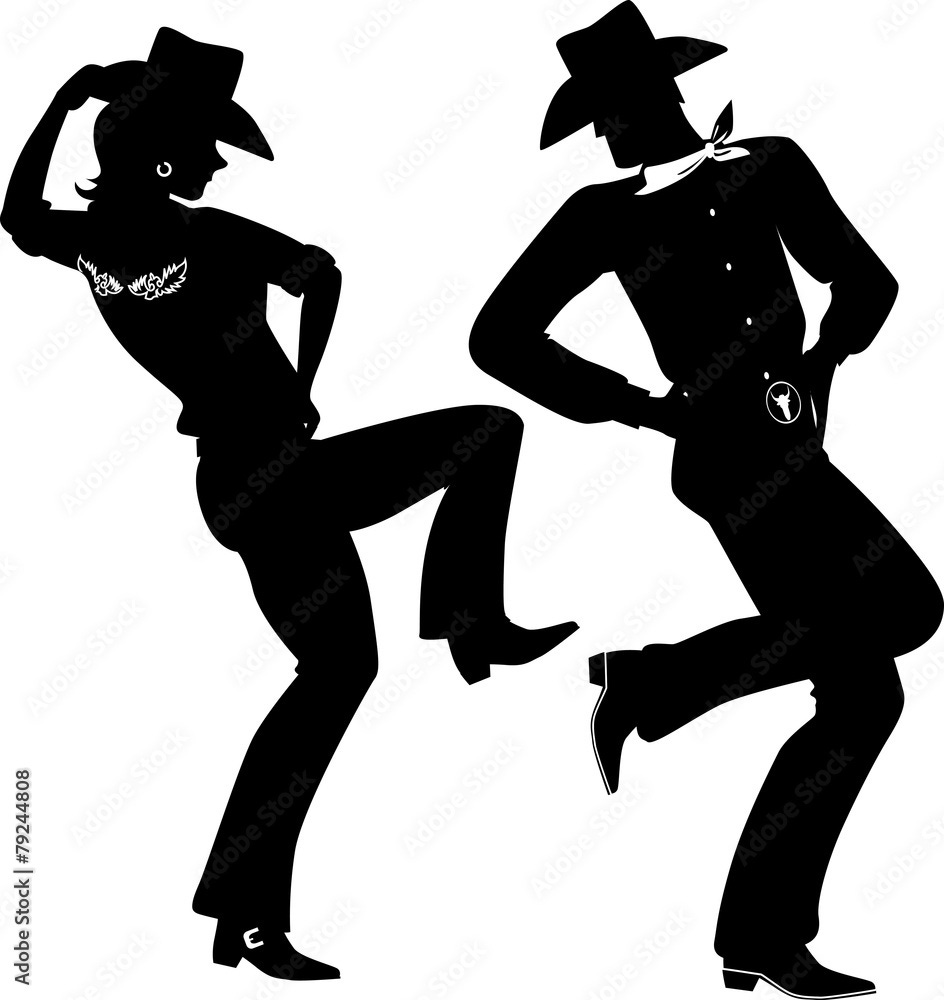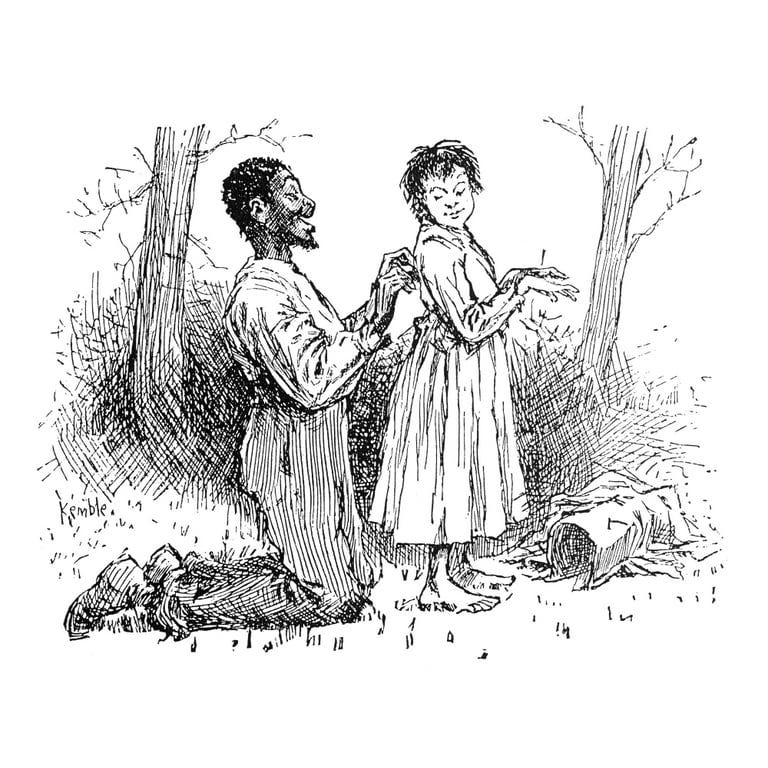“Remember, Don… when God closes a door, he opens a dress.”
-Roger Sterling
Back in the late nineties, I found myself engaged in an awkward conversation with an unusual Jewish girl. In those days, fifteen year olds didn’t do their homework in adult cafes, even in Greenwich Village. After twenty years of cafe life, I knew that the most hip prep school girl wouldn’t go beyond eye contact with me, unless she was with three or four of her horniest friends. She certainly wouldn’t saddle up next to an older black man and start a conversation. Yet over several months, this girl and I had worked up a comfortable rapport, much of which referred to her schooling, her plans, and her family, who lived a block away. Not one to talk about myself, I was intrigued by her courage, especially in an age when headlines screamed of child abductions. What would her mother think if she found her talking to this beige chap with the beret?
But the awkward thing this day was her sudden lapse of courage. She had informed me that she was taking a course entitled, The Literature of Alienation, and when I asked what they were reading, she recited the usual names: Jack Kerouac, William Burroughs, Timothy Leary, etc. When I asked why James Baldwin had been omitted, she sat back, puzzled. Being unusual, she kind of knew who he was, but defended the teacher’s choices, anyway. Who in America is more alienated than black people, I asked her? Having been raised in the Left Bank of Liberalism, she was surprised to be struggling for words. Don’t Nobody Knows My Name and Stranger in the Village sound more alienated than On the Road? Now, she was annoyed. But I persisted: why study alienation if one evades the thickest part of it? Abruptly, she stopped twirling her dishwater brown dreadlocks and blurted: “that’s not my experience..!”
Of course, we both knew she was defending her cultural turf, one which entitled her not only to despise me for exposing it as an illusion, but one which expected me, an elder, to accept her betrayal of my heritage. Flustered, she rose and bid a cold farewell before rushing out. I saw her only twice after that: once during the remainder of her prep school years; and just after her first year at Northwestern. Gone was the open ease of cultivated youth, replaced by the calculating warmth of the budding professional. Her forced smile declared that her earlier courage had been combed out, like her hair.
At about the same time, I had become friendly with another unusual student. But at twenty-six, this guy was ten years older. He was an artist from the Georgia backroads, married, but his wife was still living in Florida while he paved the way for them in New York. His short wiry frame, together with his buzzed grin, couldn’t hide the steel in his arms. He looked like Popeye with glasses and a paintbrush, glad to see the back roads in the rear view mirror. When I met him, he was taking classes at the Parsons School of Design, where, it turned out, alienation was on their menu, too. So it amused him to report back to me about his teacher, who happened to be a white woman. Indeed, James Baldwin had been on their reading list, along with the usual names. But as the semester wound down, he noticed that the Baldwin book had been ignored. When he alerted the teacher of the omission, she simply announced that they hadn’t the time, and that the class wouldn’t be penalized by being tested on it.
These two cases, hardly exhaustive, both suffice in hitting America’s blind spot, moral evasion, right in its secular temple- the school. From opposite sides of the tracks, both students unpeeled the same layer of the American problem outside the place they had paid to perform the task. One chose to blink, while the other smiled at having been slightly ahead of the curve. A decade later, a television series would take on alienation and once again hit a nerve. Only this time, the blink and the smile came together. This is because the Mad Men Phenomenon could very well have been a national class project. And by phenomenon, I not only mean the show itself, but the criticism, which generally rates it a smug confection to a beloved decade. Actually, the Mad Men Phenomenon is an internal conversation between the educated audience and its relatives in the retail and commentary business. Therefore, the word “complex” was thrown around, as if the blink and the smile were the stuff of literature.
America’s Cultural Two-Step
If it was to be so, then one would hope that complexity would mean more than sliding from one convenience to another. For instance, if a Mad Men critic expressed a reservation (“a classic John Cheever short story teased out to the length of Lost.”), he invariably gushed, as People magazine did here, (that “no other series has ever examined the American dream with such confidently unwavering pessimism”). How can one justify unwavering pessimism when all the main characters fell on a thick green lawn? More interesting is when Daniel Mendelssohn, in the New York Review of Books, scratched at the blind spot exposed by my two student acquaintances: “Although much has been made of the show’s treatment of race, the “treatment” is usually little more than a lazy allusion—race never really makes anything happen in the show.” Nor did race make anything happen in his review. This was odd, because he missed the opportunity to show how Blacks, not hip ad executives, made the Sixties happen.
Instead, he found it “touching” that the “‘eye’ of the show’ (was) the uncomprehending children”. “The point of identification is, in the end, not Don but Sally, not Betty but Glen: the watching, hopeful, and so often disillusioned children who would grow up to be this program’s audience, watching their younger selves watch their parents screw up.” This well-compensated “screwing up” may partially explain the show’s appeal, but it also demonstrates how muddled our sense of the classic has become since, say, Huck Finn. I can hear my dreadlocked acquaintance saying, ‘barefoot Huck would be a homeless man in Washington Square Park today. There are no more Wild Wests to conquer’. That’s because you’ve moved that Wild West inside you, I would retort, and created an elaborate cult of smallness. I would add that in the twentieth century, the emphasis on language and technique has not only constricted subject matter, but an honest assessment of the competing interests that heat up the melting pot.
In this young twenty-first century, Mad Men’s “casually elegant American speech” has wit, but it’s morally timid and unsure. It hasn’t Twain’s distance from commercial interests, which, in the twentieth century, maintained racial segregation while bundling WASP interests with those of Caucasian ‘ethnic’ immigrants. For the Matthew Weiner generation, the latter fight is still most “American”, despite our current racial fervor. This is because the job (or the office) remains our only crucible of competence and status. Black lives may matter, and women may cry ‘me too’, but both, like the characters in Mad Men, have made the family the chief casualty in their quest for more American pie. Bette Davis was right: (morality has become) a provincial corner office and press clippings.
But Mad Men spices this office prejudice with two novelties: it shows how creative work is actually done; or better, how creative people are ‘put to work’. Surely, then, the show’s female point of identification is neither Sally nor Betty, but Peggy, the copywriter, (and by extension, Joan, the office manager). Though less educated than Lady Draper, they are the ones her daughter, Sally, will most likely report to. In fact, the world of work is the main thing we have in common with these characters. The rise of the newer Caucasian tribes converged with that of women. Even better, it put its best “worker” on the office couch, napping up strategies. In a slightly different way, The Sopranos, another series involving Weiner, puts its mobsters to work at a pool table in a place called the Bada Bing. Both shows thrive on the dormant moments of unconventional, high-stakes work. But instead of rousing the ire of today’s twelve hour a day cubicle set, this new type of paid leisure played like music to their enlightened ears.
This means that, despite all the ennui and disillusionment these shows attributed to professional success, we weren’t likely to find a sustained, penetrating critique of the ‘industry’ in question. In yet another case of having one’s Jack Kerouac cake and eating it, too, Mad Men’s languid Greenwich Village rebels could only lob softballs at the advertising genius bedding their princess and smoking their weed: “You sell the lie. How can you sleep at night?” “On a bed of money,” Don replies, like a rapper surrounded by his bitches. Never mind that Dwight MacDonald, C. Wright Mills, and Paul Goodman had, by that time, leveled the century’s most trenchant criticism of advertising and corporate culture. The mold was set, and it was here to stay. The marketing of ‘youth culture’, along with the burgeoning male-female competition, hastened the erosion of parental authority with an onslaught of new managerial types and their products. This made us ripe for a dramatic version of the blink and the smile- ‘great at work, lousy at everything else’.
Despite Peggy’s strange pregnancy, her stonewalling of both her family’s young priest and her demanding mother, nobody in Peggy’s liberated generation stood up to her. Not one charismatic rogue chastised her for calling herself a “writer”. In what was truly one of the most important scenes in the entire series, Peggy and Abe, her radical journalist boyfriend, were seated at the bar in P.J. Clarke’s. Still feeling her out, the scrubby intellectual became so annoyed with Peggy’s whining about her office hardships that he reminded her that blacks couldn’t even work in her agency. Like the dreadlocked girl thirty years later, the rising copywriter argued the point. Almost ready to leave, as any self-respecting radical would have, he decided to stay, not willing to sacrifice her limited feminine charms for a principle he himself had raised. Adding insult to injury, when he tried to order another round, the bartender ignored him. But ‘struggling’ Peggy was a regular, and so she had only to raise her hand to get the bartender’s full attention. Not only did the scene diminish Abe’s ‘male authority’, but also the social value of his humanism. If this was the scene’s point, then why reward Peggy’s callousness with the fruits of progressive conformity? The soft ironies of Mad Men and The Sopranos may provide “details with a life of their own”, but they never clarify a totally realized ideal. In fact, Weiner’s ‘mid-cult’ tool-shed merely gave today’s cubicle queens another throwaway line to criticism- “Everybody works for somebody”.
Indeed, they do. But that doesn’t entitle the insiders, under the guise of “confident, unwavering pessimism”, to indulge a myth that their own rules prohibit: the ultimate outsider can never simultaneously be an ultimate insider. Or else, the conditions and consequences of both types lose their meaning. Yet in seven seasons, not one woman rejected Don Draper. Not one. This was due not to Mendelssohn’s contention that he’s “always on” but because, like Tony Soprano, no bill was ever presented that our anti-hero couldn’t pay. And even if we applauded Draper’s superior ability, why reward him with average prizes and average stakes? One would think Draper’s charity would at some point land in the hands of a master. But Don signs over his bonus check to a heroin addict, gives a wad of cash to the epileptic brother of that season’s lover, and, in the final season, his car and cash to an amateur hustler. We need not elaborate on the Vietnam War pass he secured for the son of a Park Avenue neighbor, nor on his financial support for the crippled, real Mrs. Draper. But it’s odd that the “It” white negro from a Midwestern whorehouse, the Mr. Cool for today’s nerds, never encountered Negroes, until one worked for him. And even then, it was only women. Don Draper isn’t so much a man with a secret life; he’s a metaphor for what whiteness has become. He’s half Gatsby, half white whale.
Conventionalized Evil
But that’s a good thing, dreadlocks would say. There’s half nineteenth century and half twentieth. It’s only logical. But I’d remind her that centuries don’t submit to the laws of addition and subtraction. That illusion gains strength when your teachers and parents operate on abbreviations of a verbal tradition. She’d look at me, puzzled, as if I’d thrown her a curveball. And then, I’d read her this, from Ralph Ellison:
Huckleberry Finn knew, as did Mark Twain, that Jim was not only a slave but a human being, a man who in some ways was to be envied, and who expressed his essential humanity in his desire for freedom, his will to possess his own labor, in his loyalty and capacity for friendship and in his love for his wife and child. Yet Twain, though guilty of the sentimentality of humorists, does not idealize the slave. Jim is drawn in all his ignorance and superstition, with his good traits and bad. He, like all men, is ambiguous, limited in circumstance but not in possibility. And … when Huck makes his decision he identifies himself with Jim and accepts the judgment… that his action is evil. Like Prometheus, who stole fire from the gods, he embraces the evil implicit in his act in order to affirm his belief in humanity. Jim, therefore, is not simply a slave, he is a symbol of humanity, and in freeing Jim, Huck makes a bid to free himself of the conventionalized evil taken for civilization by the town.
No wonder my brilliant student could only reduce Baldwin’s alienation to a hairstyle; Sally Draper could very well have been her mother. If the children were indeed the “eyes” of the series, then Sally must be paired not with her dull brother but with Ben, the troubled neighborhood boy and Weiner’s real life son.
Privileged in ways Huck and Jim could only imagine, Sally and Ben seem to form the new Platonic ideal today’s women have been hankering for. But what evil do they engage, and to what effect? Sally’s refrain from sex doesn’t carry what Ellison called Huck’s “new definition of necessity”, because, like Peggy’s inconvenient pregnancy, she doesn’t face the most complex moral problems. While Sally sticks to “the conventionalized evil taken for civilization”, Ben makes all the sacrifices; and each time Sally reacts in the old, selfish way. When she has her first period, she abandons him at the Museum of Natural History, despite the fact that he had skipped out on a prep school one state away. And later, while visiting her prep school from college, he beats up one of his own crew for doing what any college boy would have done when admitted secretly into a girls’ dorm. And rather than feel guilty, Sally watches as Ben defends an honor she herself had compromised. Worse, the ugly complacency with which she watches the beating (a look also dominant in Meadow Soprano) blinds her to her own vulnerability. In their final encounter, when the surprisingly normal, grown-up Ben announces his plan to enlist in the army, Sally’s outrage can’t connect Ben’s earlier displays of honor with this one. For all the talk about novelistic density, the “pessimism” is merely the brooding of a culture half-absorbed, articulate in commerce, politics, science, and technology, yet still lacking the total vision of Mark Twain.
This is why Weiner leaves a black girl in an all-white office, and denies her humanity by sparing us the taunts and humiliations she was sure to have endured. And what about the almost universal sympathy after the assassination of Martin Luther King Jr, when, in 1966, twice as many white Americans disapproved of him than approved? Where does that sympathy come from when throughout the series not one character encounters an engaging black man? The assassination of Malcolm X was just a head scratcher to Peggy, and the Freedom Marches were to Kinsey a way to bang a black girl. For all the “exactness of detail”, the whole edifice exposes the Weiner generation’s illusions regarding the Fifties and Sixties. The Beat Poets of the supposedly boring decade of Eisenhower were not responding to white suburban ambition, but to black bebop and ‘the birth of the cool’. And the Sixties would not have happened without the ground laid by Jackie Robinson, the Brown v. Board of Education decision, the Montgomery Bus Boycott, the murder of Emmitt Till, and Eisenhower’s federal troop intervention in Little Rock, Arkansas. In fact, both the nineteenth and twentieth centuries saw the nation come apart over race- in the Sixties.
So, why would Benjamin Schwarz, in his acerbic study in The Atlantic, still claim Mad Men to be a “deeply textured, painstakingly crafted drama”? While he admits that Weiner’s exercise in detail is “unavoidably sterile”, he stopped short of applying that label to the “novels, theater, and cinema” that have inspired the Weiner generation. This omission is important, considering the sacred names that would be challenged, thereby clarifying a new cultural line on which to judge The Sopranos, The Wire, Mad Men and Breaking Bad. John Cheever, Phillip Roth, Mike Nichols, and Nora Ephron- could they have anticipated The Wire? More likely, James Baldwin could have hit on three of the four. Does this make him a better writer? Perhaps, in some cases; and in others, perhaps not. What it shows is that the ‘sterility’ which informed Weiner also informed Schwarz “…Mad Men”, he admitted, “directs its audience to indulge in the most unlovely—because wholly unearned—smugness. As artistically mistaken as this stance is, it nonetheless helps account for the show’s success. We all like to congratulate ourselves and, as a group, Mad Men’s audience is probably particularly prone to the temptation.” Could my dreadlocked friend have benefitted from an ‘earned smugness’? And why would an audience of early twenty-first century movers and shakers be so taken with something “artistically mistaken”? Again, Ellison sheds much needed light: “Huck Finn’s acceptance of the evil implicit in his ‘emancipation’ of Jim represents Twain’s acceptance of his personal responsibility in the condition of society. This was the tragic face behind his comic mask”.
Clearly, the Weiner generation does not feel this responsibility. When Schwarz is taking Weiner to task, he does what every major publication does; he links racism with sexism and Anti-Semitism, even as the series demonstrated how the two latter groups had no real grievances other than those of any newcomer. After all, didn’t Sterling-Cooper have Jewish and female clients who ‘made things happen’? And didn’t Bert Cooper reject Pete Campbell’s proposal to pursue the lucrative Negro market? But to Schwarz, the most “egregious” error is the poorly drawn Betty Draper, who doesn’t act feminist enough to have graduated from Bryn Mawr. Anything claiming fidelity to the past is bound to be partial, but Schwarz’s assumption that his generation was “enlightened” blinded him to his own era’s “conventionalized evil”. This is why he separates “emotional intelligence” from “mushy ideology and Important Points”. Under the guise of “characters being true to themselves”, he tolerates an historical rendering small enough to accommodate his enlightened view of it.
Tying Loose Ends
Ironically, the blueprint for this transformation of personal responsibility was published smack in the middle of our Mad Men era. In My Negro Problem- and Ours, Norman Podhoretz all but justified humanism’s retreat in the rise of the Caucasian ‘ethnic’ immigrant:
“As for white hatred of the Negro, how could guilt have anything to do with it? What share had these Italian and Jewish immigrants in the enslavement of the Negro? What share had they- downtrodden people themselves breaking their own necks to eke out a living- in the exploitation of the Negro?”
Notice how Podhoretz shifts the “I” of whiteness without acknowledging it. He first speaks for all whites, then conveniently assumes the mask of a half-assimilated Caucasian ethnic newbie with seemingly no group loyalty that might be called selfish. Why else would he have omitted affluent Jews from his equation? Didn’t they publish Negro books, manage Negro entertainers, own businesses in Negro neighborhoods, and control the Negro story in Hollywood?
This is why Mad Men and The Sopranos spend so much time with soft ironies, abrupt moral shifts, and ethnic group carping. With an ‘earned smugness’, they indulge Podhoretz’s omission of racial entitlement from their moral assessment of ambition. Unlike the wise, flexible idiom of Twain’s frontier, Podhoretz’s Brooklyn, like the Soprano’s Newark, is incapable of even a fleeting frankness between the races: “To the Negroes, my white skin was enough to define me as the enemy, and in a war it is only the uniform that counts and not the person”. In other words, his humanism is cynical, hardened by social forces beyond his control (but which favored him), while his “person” reduces black anger to the writings of James Baldwin and the studies of psychologists. Isn’t this the exact feeling Mad Men conveys?
While the advertising series shows the ‘white side’ of immigrant ambition, The Sopranos, like a bookend, glorifies the ‘ethnic side’, placing the lush gangster home next to that of an Italian-American doctor. With no WASPs around to corrupt (or correct) the American newbies, the immigrant here is the sole judge of himself. As in Mad Men, the Podhoretz strut reaches full bloom, where the blink and the smile amount to a full-blown ethnic strategy. Tony and Carmella’s constant angling to get inside the doctor’s world reveals a cheapened view of America. Even worse, the Cusamanos have no ethic or tradition which can justify their snobbery. The professional ethos has left them as morally bankrupt as their gangster neighbors: “We don’t play the stock market”, Jeannie Cusamano informs Carmella, “we win.”
For this to work as satire, there would have to have been something in the series better than Meadow Soprano, who goes from reprehensible brat to bleeding heart volunteer at a South Bronx legal aid office, on a carpet of straight A’s. Or Tony’s therapist, Doctor Melfie, who plies the dull tools of psychology, alien to her culture, as are her literary references (to Proust, no less). Presented only as fragments, they fail to instruct Tony, so they hang there for the educated audience, who are flattered by this literary peek-a-boo. But the atmosphere of mixed motives and cultural opportunism has only enabled the Soprano barbarism to prevail. What good is education, Tony and Carmela can say to their condescending neighbors, if ‘we have what you have, which is all that’s worth having’? And to quell working class resentment, they declare ‘we’re just like you, only more fortunate’. No wonder Meadow’s idealism only amounts to a lawyer’s defense of the family business.
If the nineteenth century line of Cooper, Hawthorne, Melville, James and Twain struggled to see the forest, then we must admit that the twentieth settled for the trees. And that blind spot, moral evasion, converting humanism into free market individualism, has felt the barrage of self-interest so keenly that any corrective is bound to fail. Like many American intellectuals, Ellison erred in linking the Black struggle with that of other minorities. That humanism he saw in Twain could not be reproduced among opportunistic strangers a long way from home ,and timid to the facelessness of the industrial complex. This is why we cannot accept Schwarz’s assertion that Mad Men is “the quintessentially American series to date”. Ignoring the central lessons of the nineteenth century, this is the Podhoretz strut tipping a deferential cap to its worst WASP teachers.
In this context, a series excluding “ethnic” characters, “cops, criminals, and the downtrodden” may be refreshing to Schwarz, but not more American. Neither is Americanness achieved by “the high number of women writers”. Who cares if they capture “the unrelenting, low-level… conversation among middle-class American males” if their liberation mimics the same misguided male assertiveness? The backlash against the series rerun, led by the actress Susan Sarandon and others, over the ‘objectification’ of women in the office scenes was actually a distraction from their current misguided assertiveness. But The Sopranos, with their gay bashing and prostitution, has escaped a similar fallout. Perhaps the thought police are intimidated, or perhaps because some critics have draped the show’s moral confusions with metaphysical garments. “It is true”, wrote Leon Weiselteir in The New Republic, “that every trust that (David) Chase depicts is drawn into the Soprano corruption- cops, therapists, priests, lawyers, officials, teachers, writers, and above all wives- but corruption, too, interests him as a human expression… And in the end he wisely insists upon the invincible on-goingness, the eternal suchness, of the life chosen. The door of the diner opens and closes, opens and closes, admitting joy or danger.”
But if The Sopranos had never existed, would we need help in concluding that evil is eternal? What is significant here is that neither Chase’s nor Wieseltier’s test for humanism challenges “conventionalized evil” with an evil that goes beyond itself. By merely accepting evil as a category of human expression, they offer no dramatic impetus for characters to make other values possible through concrete acts and sacrifices. This is why Carmela’s dabbling with Catholicism and literature fall flat, and why Christopher’s forays into screenwriting and music management end in murder. They’re simply swallowed up by the “eternal suchness” of the Soprano fortress. Of course, this determinism goes down like a fine Cabernet, particularly when the suicidal A.J. bumbles into a lucrative career. But when we consider how the mafia has gutted Italy as a political, military and industrial force, what are the social and moral implications for democracy if they can “draw in” American professionals, the clergy and the critics?
Capturing A Civilization
If The Sopranos and Mad Men have failed to provide the artistic answers to today’s cultural breakdown, then what prestige series have? The Wire (and to a lesser extent, Breaking Bad) are two that have demonstrated an interrelatedness large enough to capture a civilization. Moreover, historical series like Turn- Washington’s Spies and Hell on Wheels have reminded today’s coddled suburbanites of the depth and penetration of Huck and Jim. There never has been an era that didn’t “require the viewer to pause and replay the DVD to make out what’s being said”. Likewise, “the clear, relaxed enunciation of casually elegant American speech” has always gathered its deepest meanings from its conflict with the ‘new speech’. Breaking Bad was that rare beloved hit in which an Anglo-Mexican idiom combined to form a bleak assessment of American ambition. But the historical dramas, overshadowed by the gimmicky Game of Thrones and the feminist Yellowstone, were destined to join The Wire as media relics, respected but lacking sufficient romance to warrant marathon reruns, and star-making turns to enrich the chain stores.
If any ‘megamovie’ deserves the title “quintessentially American to date”, it is The Wire. Yes, upper crust culture is largely absent but, like the white whale, its influence is felt and examined in ways that intimidate Weiner (and many of his critics). By devoting each of its five seasons to a different institution, David Simon moved Twain’s frontier to the inner city, maintaining full continuity with the master’s rich idiom. In fact, the absence of WASP characters mirrors the historical marginalization of its ideals by Baltimore’s immigrants. This is why the Founding Fathers, with perhaps the exception of Alexander Hamilton, would have found both ‘Sterling, Cooper, Etc.’ and The Five Families a preening, familiar sideshow. But they would have removed their wigs over The Wire’s brilliant black gangstas, just as the railroad shareholders in Hell on Wheels would have swallowed their chewing tobacco the moment they had witnessed a delusional George Washington clasping his black slave/assistant for protection and guidance. They would have been reminded of their own dark, vulnerable moments, where their entitlements collapsed under “a new definition of necessity”.
More important is how these series return us to nature, exposing our cocksure technocratic ideals. They remind us that physical necessity (whether in war, in the Wild West, in the Baltimore projects, or in the New Mexico desert) creates a poise completely absent in Mad Men and sporadic at best in The Sopranos. In the same way, the female spies of Turn and the frontier women of Hell on Wheels retain a more cultivated femininity because they face the most dire physical consequences. In Sally Draper and Meadow Soprano, they would have found unworthy heirs. Conversely, the suburban daughters, just like my dreadlocked friend, would only see in their tougher ‘ancestors’ either emblems of their own strength or victims of patriarchy. At least Brother Muzone, The Wire’s highly feared, highly articulate ‘muscle for hire’, read The Atlantic and Harper's while guarding a housing project. If it bore no fruit for his community, it could very well have been because the Mad Men crew could only dance to The Twist.









